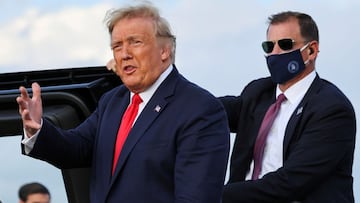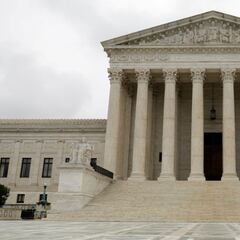US Election 2020: who does Donald Trump owe money to and who raised his legal disputes?
Donald Trump is believed to have debts of over $1.1 billion to multiple creditors, and much of it will be reaching maturity in the next three to four years.

Donald Trump’s debts are believed to be in excess of $1.1 billion – more than double the figure he has admitted to and much of it will be reaching maturity in the next two to three years. Last month, Trump admitted to NBC that he had debts of $421million: “The numbers that they released were all wrong and just so that you understand, when you have a lot of real estate, I have a lot of real estate – you know a lot of it ok? Right down the road - Doral, big stuff, great stuff – fortunately, I am very under-levered," he said. "I have a very, very small percentage of debt compared to… in fact some of it I did as favours to institutions who wanted to loan me money. Four hundred million dollars compared to the assets I have – all of these great properties all over the world. It’s a tiny percentage of my net worth. No, I don’t owe Russia money. I owe a very small amount of money and it’s very straight”.
Rising 68 stories above 5th Avenue, @TrumpTower has remained one of New York’s most iconic properties since its completion in 1983. pic.twitter.com/1O3iNfYXSE
— The Trump Organization (@Trump) October 29, 2020
Trump's wealth and assets
Trump owes to multiple creditors - banks and assets managers, and like he says, most of his debts are backed by his extensive real estate portfolio which includes office towers, golf resorts, hotels and residential properties. Forbes estimated his net worth is around $2.5 billion and he is believed to have taken out loans with at least six creditors and several of those bank loans have since been repackaged and sold on as securities on the bond market.
Trump owns 30% of 1290 Avenue of the Americas office complex in central Manhattan, New York City. The Trump Organization and business partner Vornado Realty Trust took out a $950 million loan from four financial institutions: Deutsche Bank, UBS, Goldman Sachs and the Bank of China in 2012. Forbes estimate that he owes $285 million at an interest rate of 3.34%. That loan is due in November 2022. In another deal with Vornado, Trump holds a 30% stake in the 52-storey 555 California Street skyscraper in San Francisco. His debts from the transaction, to US insurers Met Life and Pacific Life, stand at around $162 million accruing 5.1% interest and are due in September 2022.
See also:
When did Trump start his election fraud narrative?
How likely is Trump to win his voting law suits?
What was the slimmest margin of victory for a US presidential election?
Who is Sarah McBride, the first transgender state senator in the US?
Trump's underperforming hotels
Then there is the $170 million mortgage with Deutsche Bank on the Trump International Hotel in Washington DC – the redeveloped Old Post Office which opened in 2016. It is not known how much of the debt is still outstanding. It is due in 2024. Another hotel, the Trump International Hotel at 1 Central Park West, New York has not been performing as well as expected and has since been flagged as a potential risk. It is not known how much of the $6.5 million refinanced mortgage has been paid off to creditors Ladder Capital.
In 2016, Trump borrowed $160 million from Ladder Capital to refinance his 40 Wall Street skyscraper in Manhattan. According to the New York Times, he still owes $138 million with the loan at 3.665% interest and due to mature in July 2025.
Related stories
Another sizable debt is the mortgage owed to Deutsche Bank for his National Doral golf course in Miami since 2012. Forbes report that the debt has risen to over $125 million while the New York Times claim that the figure is closer to $148 million. The Doral suffered losses totalling $162 million between 2012 and 2018.
Trump also has many other, smaller debts of between $5 million and $25 million on residential properties in New York, Palm Beach, Florida and golf courses in Washington DC and Colts Neck New Jersey. Most are with small banks and do not mature within the next four years.

